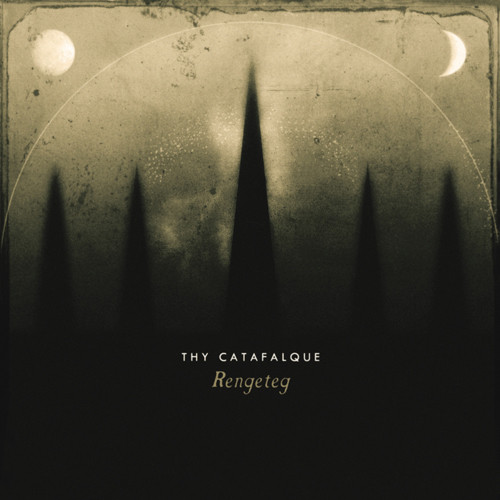
I listened to a lot of albums in 2011, most of them new releases. I made mental lists and written lists of the ones I wanted to review, not because I think I’m particularly good at it, but because I want to do my part to help spread the word about music I admire and to support good bands so they’ll continue making music that makes me happy ( yes, it all comes down to selfishness in the end).
Of course, I fell down on the job miserably. I just didn’t get around to reviewing everything I wanted to praise in 2011. With the new year under way, I know that psychologically I’ll feel motivated to focus on new releases this year instead of trying to catch up on writing about 2011 albums. But if I never write about another 2011 album, there’s one I cannot leave unheralded — Rengeteg.
If this 2011 album from Thy Catafalque consisted of the 9 minutes and 20 seconds of “Fekete mezők” and 51 minutes of mind-numbing elevator music, I would still be happy. “Fekete mezők” is one of my favorite songs of the year. But that song is just the beginning of an album’s worth of musical marvels — and no two of them are alike.
The songs flow into each other without pause, pulling the listener along with them as they cross a constantly changing landscape of sounds and emotions. The idea of crossing a landscape isn’t just the feeling conjured by the movement of the music. It also emerges from the lyrics.
The words are in Hungarian, but they’ve recently become available in English translations, and I found them interesting to read while listening to the album (for the umpteenth time). If there’s a concept I can discern, it is one about the unity of life and matter, about the connectedness of human beings to the Earth, and more than the Earth, to the star-spawned matter of which we and it are made.
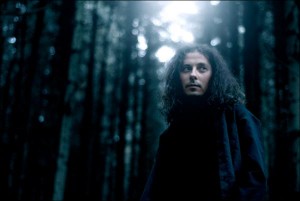 For example: That song “Fekete mezők” means “black fields”, and the lyrics speak of the “thud of wheels hurtling along”, of “pace, movement, dynamics in motion”, of the “flames of mechanic icons above us” and “meteors burning in red to the Earth”. The music is charged with a quasi-industrial rhythm — it hurtles along like a locomotive and blazes like a meteor, driven by an amazingly infectious series of riffs and a heavy, distortion-effected guitar tone that becomes a signature sound on Rengeteg.
For example: That song “Fekete mezők” means “black fields”, and the lyrics speak of the “thud of wheels hurtling along”, of “pace, movement, dynamics in motion”, of the “flames of mechanic icons above us” and “meteors burning in red to the Earth”. The music is charged with a quasi-industrial rhythm — it hurtles along like a locomotive and blazes like a meteor, driven by an amazingly infectious series of riffs and a heavy, distortion-effected guitar tone that becomes a signature sound on Rengeteg.
Ethereal keyboards and a piercing, clean guitar solo complement the persistent rhythms and make you see in your mind’s eye what the lyrics are describing. The song includes not only harsh vocals but also — and it’s a sign of what’s to come — really impressive clean vocals in the chorus, provided by session vocalist Attila Bakos.
That opening song is followed by another in a similar musical and lyrical vein. “Kel keleti szél” (eastern wind rising) is an immediately infectious barrage of clattering drums and distorted riffing, with a synthesized melody flowing through and bounding above the powerful rhythmic charge — and the lilting clean vocals of Bakos are even more present. The song tells the story of “an eastern wind rising to bring” a traveler home, rolling on iron wheels through tunnels, across bridges, through industrial estates. Again, you feel in the music the story that the song is telling.
With those two musically similar songs standing as a kind of “introduction”, the album then moves into different terrain with “Trilobita”. Electronic beats pulse urgently, and the song starts with a bouncy riff and tinkling keys. It has a pop kind of infectiousness, almost like a dance, with those clean vocals helping to spin out a swirling folk melody.
Lyrically, it’s also a different path in the journey, at least as I interpret the words. People move across the Earth, but they also move through time, and matter moves through them. The trilobite heart beats beneath the ground and also in our bodies, as the atoms of physical existence turn and transform and move through the world and through us.
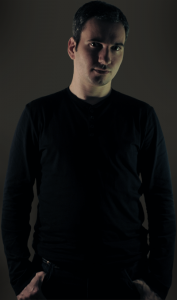 With the fourth song, “Kő kappan” (stone thumping), the mood dramatically changes again. The almost entirely instrumental song begins with a simple keyboard melody, sounding almost like a calliope, both playful and wistful. As the song progresses, however, strings and a pounding drum join in, and the music swells in almost orchestral grandeur. Brief vocals sing about blue clouds soaring above, a stone thumping, and woodland droning. It’s a beautifully imagined, beautifully realized piece of music (even if it’s not metal).
With the fourth song, “Kő kappan” (stone thumping), the mood dramatically changes again. The almost entirely instrumental song begins with a simple keyboard melody, sounding almost like a calliope, both playful and wistful. As the song progresses, however, strings and a pounding drum join in, and the music swells in almost orchestral grandeur. Brief vocals sing about blue clouds soaring above, a stone thumping, and woodland droning. It’s a beautifully imagined, beautifully realized piece of music (even if it’s not metal).
“Kő koppan” proves to be an interlude, or perhaps a prelude to “Vashgyek” (iron mountains), the album’s 14-minute centerpiece, in which Thy Catafalque’s alter ego Tamás Kátai draws together all the musical strands on display in the album. The ingredients include those distinctive, heavy, grinding guitars and pounding percussion; acoustic folk-style melodies; shimmering keyboards; echoing guitar leads and pulsing bass lines; a varied mix of harrowing, harsh, distorted vocals and clean singing (including a memorable guest appearance by Agnes Tóth from the neo-folk band The Moon and the Nightspirit). It closes with all hell breaking loose in a firestorm of badass riffage.
Immediately after the strong finish of “Vashgyek”, “Holdkomp” (lunar module) switches gears again. It’s entirely instrumental and the most avant-garde track on the album — sampled mechanical noise and sounds of roaring, pulsing, droning electronica; a ratcheting synthesizer beat and a tinkling melody; industrial propulsiveness with a prominent bass line; that distinctive distorted guitar tone — it’s all there.
“Kék ingem lobogó” (my blue shirt waving) virtually reprises the melody from the opening track — and thus it’s also catchy as fuck — but with more electronica in the mix. A bass line weaves a web, the heavy guitar makes you want to jump up and down, the exotic folk-inflected vocals still like nothing you’ve heard before (unless perhaps you’re Hungarian), the lyrics telling of a blue shirt cut from the blue dawn and the dew on blue forests, and this:
“Look at me, my good mother sun, look at me,
Run through my roots, my veins,
Pour my heart to the brim with light,
Let it beat with the black soil.”
And then in the next song the rain falls: “Az eső, az eső, az eső” (the rain, the rain, the rain). And it is the sound of rain, slow, melancholy, beautiful. “I leave during the autumn, fog follows me slowly / The runway rolls through hazy fields . . . And it is raining on and on / Tumbling down on my heart . . . And I shall be the mist in a city long gone / The time roaming on streets deceased.”
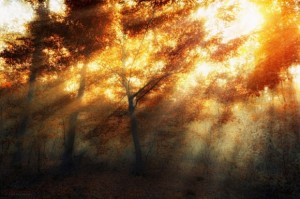 Two songs left, and the next one — “Tar gallyak végül” (bare twigs eventually) — is also largely instrumental, but the music is full of power, the drums clattering and pounding, the heavy guitar sound falling like granite and a different guitar tone flowing like molten lead, the synthesizer again carrying the melody, and it ends with the sound of wind or rain and what I imagine is the sound of crows calling to their kind. And these words:
Two songs left, and the next one — “Tar gallyak végül” (bare twigs eventually) — is also largely instrumental, but the music is full of power, the drums clattering and pounding, the heavy guitar sound falling like granite and a different guitar tone flowing like molten lead, the synthesizer again carrying the melody, and it ends with the sound of wind or rain and what I imagine is the sound of crows calling to their kind. And these words:
“A bell on the forest,
A song of poplars,
I know, the arm shall become mud
Or bare twigs eventually.
Into the depths leans everything,
Into the sun greylags are flying,
And wind rattling in the body at night.”
How can this album finish? I was curious as hell to find out, as I came to the final track. What mood would it convey? Would we be carried further into sublime philosophies? Or would we return to the wildness of nature? Well, the last song came out of nowhere, nothing like the conclusion I expected. It warmed my black fucking heart.
“Minden test fű” is the most truly black-metal song on the album. From the beginning, it’s a howling onslaught of pounding percussion and roaring, eviscerating waves of distorted guitar — scything, blistering, galvanizing. Brief, clean spoken vocals are almost overwhelmed by the cacophony — and then the song becomes something different, something more, with the wonderful vocals of Attila Bakos slowly crying that “all flesh is grass flying away in the wind”, while the instrumentation behind him whips like a fury.
And at the end, the lead guitar breaks into a folk-inspired dance, the drum hits a rock beat, and suddenly the music stops. In retrospect, it’s a perfect ending. Nothing has been predictable up to now, so why start at the end?
Given my usual extreme tastes in metal, there’s a lot of music in this album I shouldn’t like — but I loved every bit of it. It’s fascinating, unorthodox, emotionally powerful, beautifully worded, heavy as fuck, truly inspired — as connected with the part of me that wants to spin around and headbang ’til my neck hurts as it is with the part of me that wants to believe that I’m part of something larger than what I can see around me, the part of me that wants to believe it will live forever.
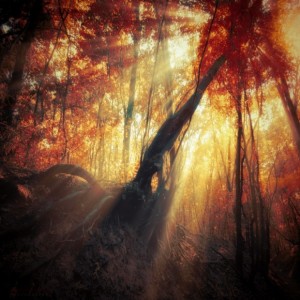 I’m not going to say this is my album of the year for 2011, because I’m so fucking mercurial that no doubt I’ll wake up tomorrow and think of another that would be a competitor, but as I write this now, I’m thinking it has no equal.
I’m not going to say this is my album of the year for 2011, because I’m so fucking mercurial that no doubt I’ll wake up tomorrow and think of another that would be a competitor, but as I write this now, I’m thinking it has no equal.
Which song to play for you? Well, my favorite song will be showing up in another post later today, one that has something to do with infectiousness. The one I’ll play now probably won’t come as a surprise. As much as I appreciate the songs on the album that are strikingly different from my usual fare, I still am who I am, and I think I know my NCS people, too. So turn this thing up loud and prepare to be knocked down. Just remember, it changes, and changes again.
“Minden test fű”
[audio:https://www.nocleansinging.com/wp-content/uploads/2012/01/10-Minden-test-fu.mp3|titles=Thy Catafalque – Minden test fu]Rengeteg was released by Season of Mist internationally on November 11, 2011, but its official U.S. release is . . . today! Thy Catafalque can be found on Facebook via this link and the band’s official site is at this location.
Tamás Kátai is Thy Catafalque. He wrote the lyrics and the music, performed all the instruments (except the cello), did the drum programming, and delivered the harsh vocals. He deserves congratulations on an amazing accomplishment.
The English translation of the lyrics on Rengeteg can be found on the web here. But because the lyrics are so good and are so important to grasping the album as a whole, I put them in a document that can be downloaded by right-clicking on this link and saving the file:
Oh, one more note and then I’ll stop: I just learned that the marvelous Attila Bakos has his own one-man project called Taranis, with a debut album available at Bandcamp called Kingdom. I’ll be checking that out.

It was frikkin released on 11.11.11! What were you doing for so long?!
Why does one feel like “Fekete mezők” will be on the Most Infectious… list now?
Anyway… have you had any luck finding lyrics for Róka Hasa Rádió translated into english?
Google Translate is turn-off. 😐
Odd. I always find random, meaningless phrases shouted at me vehemently a turn on.
And now we all know why I live in Japan.
FUCKIN’ SALE! 70% REMOVE YOUR CLOTHES! FAST TIME HAPPY TIME GOOD TIME FUCK SHIT!!!
KAWAAAAAAAAIIIIIIIIIIIIIIIIIIIIIIIIIIIIIIIIIIIIIIIIIIIIIIIIIIIIIIIIIIII!!!!
Bwahahahahahaha!
It’s a turn off in this case because one’s imagination of Tamas Katai singing the Google-translated lyrics, as opposed to the original Hungarian, is so awful it’s not even funny.
Also, he’s not shouting. Shouting the Google-Translated lyrics might have been a turn on…
To answer your question, no, I haven’t yet found an English translation of the Róka Hasa Rádió lyrics. If I do, I’ll add a further comment here.
Like a fine wine, my review has been cellaring until the day when it could be uncorked at the peak of its tastefulness and, uh, aroma.
I hold my farts in on the train in the same way.
Still doesn’t smell as bad as all the businessmen and their 7 am stench of hang over, depression, and meaninglessness.
One can only imagine that stench.
Coming to the notion that storing farts ages them… You would need the shit that produces the fart to age actually. But, one thinks putting the digestive tract under such pressure would actually slow down the “aging” process. In other words, you either need a longer rectum or a diaper which can fart.
The song felt long. In a good way. They covered a lot of ground in five minutes or so–without jarring transitions. I applaud that!
Glad you liked it. And you put your finger on something I wish I’d mentioned in the review — the ability to include really diverse elements within the songs in a way that feels right, even though it’s often surprising.
I’m not sure if I like Rengeteg or Róka Hasa Rádió (the only two Thy Catalfalque albums I have so far) more, but I think they might be on equal ground. Too bad that Season Of Mist held off on the North American release until now, not that one couldn’t get the album anyway.
I’m a bit surprised that you like this stuff as much as you do, but Tamás offers up something different and does it masterfully. I didn’t care for the early stuff (as included in the first post about Thy Catafalque you posted), but I am glad that he went in this direction instead.
Best album of 2011? I dunno… then again, I call it a 2012 release, but that’s more semantics than anything else. Regardless, it is one of the best new albums I’ve heard in the past year.
This is probably one’s #2 of 2011, Cormorant’s “Dwellings” being #1. Of course, it might just be
because one liked “Rengeteg” less than “Róka Hasa Rádió” but liked “Dwellings” more than “Metazoa”.
If one is to call it a 2012 release though, “Rengeteg” might just be one’s #1 of 2012.
Well, if you call it a 2011 release, it’s certainly top 5 material along with the likes of Dwellings, Esoteric’s Paragon Of Dissonance and Leprous’ Bilateral. I’m not sure who else I’d pick to round out the top five and I certainly couldn’t rank the five.
As a 2012 release, it’s set the bar high for the next 11 and a half months. Honestly, for albums of this caliber, I think Ne Obliviscaris has a shot to match it, with albums from Nothnegal, Barren Earth and Gojira to consider. Testament, Napalm Death, Black Sabbath, Earthen Grave and GWAR are also on my watchlist so far for this year, although they probably won’t all be best of the year material.
Regardless of what release date you look at, I hope Thy Catafalque doesn’t get overlooked. This is too damned good to get buried under all the new releases.
Oh, since you mentioned it, I liked Metazoa a lot more than Dwellings. It’s good, but I haven’t falled in love with it like I did their previous outing. I feel the same way about Leprous’ latest as well.
I’m glad you reminded me about Nothnegal. It’s been a long wait for this album. The international release is Jan 20. The US release has recently been moved to Feb 28. Album art is cool:
https://www.nocleansinging.com/wp-content/uploads/2011/12/Nothnegal-Decadence.jpg
So is this “flyer” about the release date:
https://www.nocleansinging.com/wp-content/uploads/2012/01/Nothnegal-Decadence-release-flyer.jpg
Well, it may very well end up being my next purchase, after my next paycheck (tomorrow).
Check into getting Tűnő Idő Tárlat. It’s where he really started with the experimentation that makes the last two albums so great. ‘Neath Waters’ alone is worth the price of admission.
‘Neath Waters’ is pretty much his best piece ever so far, so no wonder about that.
I think you already know how I feel about this album. Needless to say, I could not agree more.
Hi! I simply would like to offer you a huge thumbs up for the excellent info you’ve got here on this post. I’ll be returning to your site for more soon.